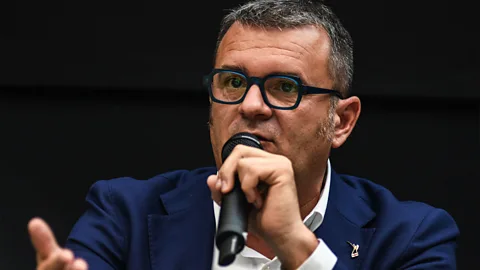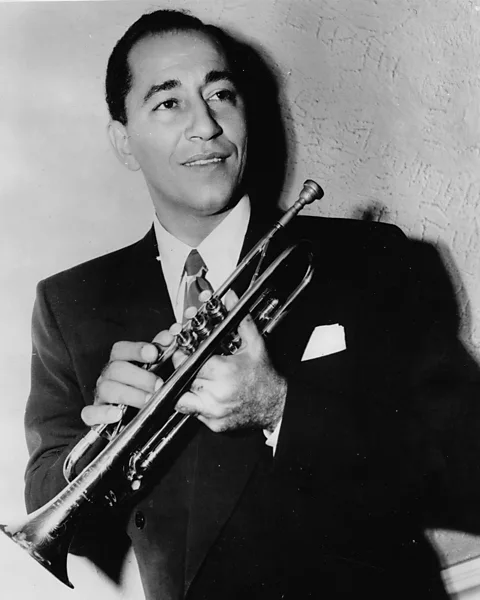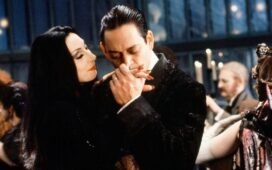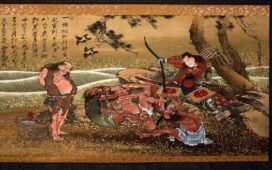 Alina Pyazok
Alina PyazokOne of the most controversial entries in the Eurovision song contest is Espresso Macchiato by Estonia’s Tommy Cash. It mocks Italian stereotypes, and there have been calls to ban it.
The track by Estonian rapper and singer Tommy Cash is the country’s entry into the 2025 Eurovision Song Contest, which takes place next week. When its inclusion in the competition was announced, some reacted with bemusement, and others with outrage, especially in Italy, due to the way Cash seems to mock the country with his faux-operatic, broken Italian accent and deployment of Italian stereotypes. “I love anything trashy,” Cash tells the BBC, giggling, explaining the simple thinking behind the track, which some Italians have even called on to be banned from the competition.
Espresso Macchiato is hardly the first song to send up Italian stereotypes: see the Italian-American novelty songs of the war and post-war period like Mambo Italiano and many others. And self-parody is part and parcel of Eurovision, particularly among Eastern European acts – see for example Poland’s 2014 entry My Slowianie, which parodied the country’s gender stereotypes, or Greece’s satirical 2013 song Alcohol is Free, which dealt with the Greek financial crisis. However Cash’s Eurovision entry may be the first to parody another competing nation. It’s a bold choice for Eurovision, an event that has functioned as much more than a mere singing competition since its inception.
Disrupting Eurovision values
Today, Eurovision sees more than 35 countries, mainly from Europe, participate while it holds the distinction of being one of the world’s longest-running annual television broadcasts, drawing a huge global audience of hundreds of millions. It fosters interconnection among European nations, becoming fodder for small talk and providing a sense of shared purpose and mythos across the continent. And while its rules explicitly forbid “lyrics, speeches, gestures of a political or similar nature”, Eurovision has served a political purpose. Since the inaugural contest in 1956, when it was set up by Marcel Bezençon, the director of the European Broadcasting Union (EBU), to help unify a fractured post-war Europe, Eurovision has served as a stage for “cultural exchange, diplomacy, and national branding”, according to one study.
“The purpose of Eurovision is to unite Europe,” says musicologist Anna G Piotrowska. “It’s educational, too, a way [for audiences] to learn about a country’s traditions and how its people express themselves today.” In that way, we might liken Eurovision to a very mild display of national propaganda, with songs often designed to showcase their country’s cultural values and appeal. Fittingly, media scholar Göran Bolin argued that the Eurovision Song Contest is the musical equivalent of a world’s fair, a large-scale international exhibition that brings together countries from around the globe to showcase their cultures and achievements.
For Estonia, Eurovision carries particularly weighty significance. The country has only won the competition once, for their 2001 entry Everybody. One commentator described that win as the single most important event in Estonia’s history since it secured independence from the Soviet Union 10 years earlier. Indeed, the victory was seen as a crowning moment for the country’s successful reintegration back into Europe as it sought a clean break from its communist past. Now, with Estonia currently trying to phase out school pupils being taught in the Russian language, it is seeking to re-establish its cultural independence. It is odd, then, that it has plumped for a song this year that has nothing to do with its own culture. What’s more, Cash’s entry appears to satirise the very notion of national representation upon which Eurovision rests.
Given that the competition is such a useful tool for cultural diplomacy, why, then, is Cash entering with a song solely devoted to mocking Italian stereotypes? “Because it’s funny,” he says, which is one of his common catchphrases. Cash treats whatever tickles him with grave seriousness, crafting his comedy with great meticulousness. But his pranksterish attitude has rankled certain Italians, as well as members of Eurovision’s year-round international fanbase.
 Alamy
AlamyWhile filming recently in Brazil, one Eurovision fan gave Cash a piece of her mind, he recalls. “She told me that half of the fanbase loved me and the other half couldn’t stomach me, because they feel I’m mocking Eurovision and just treating it as some big joke,” he says. “That’s just not entirely true. If this were all some big joke for me, I wouldn’t be putting all this work into it. I’d just stand at the back of the stage, drink coffee, and wait for the lights to come back on.” In fact, Cash says he’s treating Eurovision like a “boxing camp”. Speaking to him two months out from the competition, he says he’s already rehearsing five full days a week.
A history of provocation
Cash’s taste for parodying other cultures is not limited to Italy. Last year, he released Untz Untz, a song whose title is derived from the stereotypical sound of a dance beat, which was a clear spoof of German techno culture. Indeed, Untz Untz, he says, was the catalyst for setting his Eurovision journey in motion. He received astonishing national support for it, with the official Estonian Olympic team posting his extremely risqué video on their social media. It became a building block for Cash’s Eurovision journey, suggesting to him that he would have the necessary national backing to enter, as was proven, when he won Estonia’s Eurovision pre-selection contest Eesti Laul in February. “It also proved to me that this is the year when I do stuff that I haven’t done before,” he says. “My career is pretty colourful, and I’ve done so many interesting projects. You know, why not have Eurovision on my Wikipedia page and put my name in the history books of my country?”
Born Tommy Tammemets in 1991, around the time of the dissolution of the Soviet Union, Cash grew up in a poor district of Tallinn. After getting expelled from school, he transcribed his childhood experiences into rap verses. “The year was grey, 1991, when Tommy got produced by some chemical waste,” he spat on his 2013 breakthrough Guez Whoz Back. He later became one of Eastern Europe’s foremost provocateurs, billing himself the “Kanye East” of Estonia. The wickedly mischievous humour he brandishes in his songs is deliberately absurdist, inspired as much by Andy Warhol as by Eurotrash acts like Scooter and Basshunter. He has collaborated with everyone from Charli XCX to a rapper named MC Bin Laden. Outside of his music, he has gone viral for posing on horseback in a McDonald’s drive-thru in Tallinn, and showing up at Paris Fashion Week wearing pyjamas and a wrap-around duvet.
Espresso Macchiato, he says, was the product of his frequent trips to Italy, where he typically goes to record. The words Espresso Macchiato simply entered Cash’s head, he says, with “zero references to anything else, zero anything; it was just one of those songs”. He then built out the song around the most obvious Italian identifiers he could think of.
While Cash has offended some Italians, some others have been impressed.
Paolo Prato, a lecturer in Italian Studies at John Cabot University in Rome, acknowledges that Cash is invoking “a predigested version of Italy”, but says his performance in the Espresso Macchiato music video is still “credible to many Italians”, as his choreography appears to mimic the springy movements of beloved Italian showman Adriano Celentano. Still, Prato notes, within Italy, Cash’s song has been, in a word, “controversial”. On one hand, the song has gained famous Italian fans, such as the “grannies from Ostuni“, who have danced to Cash’s song on TikTok, achieving semi-viral status. On the other hand, Codacons, the Italian association responsible for consumer rights, has requested the song’s disqualification from the competition, citing offensive stereotypes, while politician Marco Centinaio, another among the song’s leading critics, has said: “those who insult Italy should stay out of Eurovision”.
However Lauri Bambus, the Estonian Ambassador to the Italian Republic says that, a few criticisms, particularly in regards to Cash’s “broken Italian grammar”, aside, he has personally received “very positive feedback” about the song. “Italians love catchy melodies and do understand jokes,” he says, adding that “Espresso Macchiato can often be heard in cafeterias in Italy and people seem to enjoy it”. Cash was also welcomed with enthusiasm when he performed on popular Italian channel LA7. “They loved us,” says Cash, “I had so many Italians come up to meet in the street after saying ‘you’re a legend!'”.
Italian stereotyping through the ages
While the negative reactions to the song has drawn have been severe, such positive reception elsewhere suggests that some Italians take the stereotypes about their culture in their stride. “Generally speaking, [Italian stereotypes] are constructed from the outside,” says Prato. They are a way for tourists and foreign observers to comically simplify their impressions of Italy and its rich culture, he explains, and are largely based on the country’s food these days, since, “food identifies Italy’s history and anthropology more than anything else”. Italian food, such as pasta, pizza and ice cream, has been exported around the world thanks to one of the largest voluntary migrations in global history, with 13 million Italians moving abroad between 1880 and 1915. “[This] has significantly contributed to its global reputation,” says Prato – but also left it more vulnerable than other cultures to widespread stereotyping.
 Getty Images
Getty ImagesIndeed, as Italians emigrated to the US in large waves during the late 19th and early 20th Centuries, anti-Italian sentiment also began to foment in the country, and Italian stereotypes took on a negative valence. Since many Italian immigrants were from agrarian backgrounds and competed for low-paying jobs, “they were associated with poverty, dirt, and a backward mentality”, says Prato. However as the Italian migrants integrated further into the larger population, the perception of Italian culture became more favourable. “Pizza, pasta, coffee and many other Italian culinary habits changed status and became associated with a positive image of the country,” says Prato. As a result, Italian-American musicians of the 1950s, including Dean Martin and Louis Prima, released songs with jubilant references to pizza, pasta, wine, and cappuccino. Then, in the 60s and early 70s, with the rise of Italian-American mafia movies, most notably The Godfather, Italians took centre stage in US and global culture in a whole different way.
Italy is not only a cultural behemoth, but also a vital part of Eurovision’s history. The competition was originally modelled after the popular Festival della Canzone Italiana, a singing event held in the Italian resort of San Remo.
Nowadays, anyone who watches Eurovision can expect the contest to feature a fair share of its own stereotypes, with its mix of eccentric high-energy pop songs, earnest power-ballads and the requisite heavy metal entry (this year’s comes courtesy of Portugal).
This is fertile ground for Cash, who says he loves “to play with stereotypes”. But behind the tomfoolery lies a much more earnest impulse. “My purpose as an artist is to show people, 100 percent, that a person from Estonia can do anything,” he says. “We can impact the world and bring something original to the stage.”
John Kennedy O’Connor, a regular Eurovision commentator, says that despite of, or even because of all the controversy, Cash’s song is already the most well-known heading into the competition. Even if he doesn’t come out on top on the night, he’s already won. “He’ll still be remembered on Monday,” says O’Connor.









Recent Comments